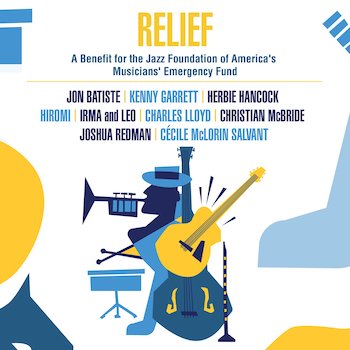Jazz Album Review: “Relief: A Benefit for the Jazz Foundation of America’s Musicians’ Emergency Fund”
By Michael Ullman
There’s a pleasing variety in this collection, which serves up valuable music that might not have otherwise been heard.
Relief: A Benefit for the Jazz Foundation of America’s Musicians’ Emergency Fund — $34.99. (Mack Avenue)
 This disc should become a collector’s item. It contains nine previously unreleased numbers and ends with Herbie Hancock playing the late Jimmy Heath’s “Gingerbread Boy” live with the composer and another departed giant, Wallace Roney. The album’s value is compounded by the fact that its proceeds go to a foundation that offers direct support as well as help with healthcare and housing to jazz musicians in need. We are in COVID times, so the demand for assistance has rarely been as severe. The generosity of the all-star musicians represented here should be appreciated.
This disc should become a collector’s item. It contains nine previously unreleased numbers and ends with Herbie Hancock playing the late Jimmy Heath’s “Gingerbread Boy” live with the composer and another departed giant, Wallace Roney. The album’s value is compounded by the fact that its proceeds go to a foundation that offers direct support as well as help with healthcare and housing to jazz musicians in need. We are in COVID times, so the demand for assistance has rarely been as severe. The generosity of the all-star musicians represented here should be appreciated.
And we should appreciate the music, rescued from the vaults. The collection begins a little wildly with “back to who,” recorded by Esperanza Spalding, who is doing the vocals, along with Leo Genovese on piano and “production,” and Juan Chaivassa on percussion. It was recorded and overdubbed “at home in Hillsboro, Oregon OR at home in Brooklyn.” It begins with an atonal Genovese playing a few frantic bars while Spalding speaks a few words we are not expected to understand. Almost immediately, Genovese plays the theme on electric piano and Spalding seems to improvise, her own voice layered over itself. Then Genovese takes a more conventional piano solo and Spalding riffs behind him. I think the message is that you are who you believe you are.
Christian McBride’s “Brother Malcolm” follows. Its sober melody is played in stately fashion by saxophonist Marcus Strickland. Though not performed with the force of the master, the piece sounds a bit like one of John Coltrane’s meditative pieces, though a pleasing lyricism runs throughout. (The recording comes from the sessions for McBride’s New Jawn.) This track sets the approach for the Relief discs: saxophonists dominate. Kenny Garrett’s playfully boppish “Joe Hen’s Waltz” is from his Seeds from the Underground sessions. It proffers a complicated line, and Garrett seems to proceed carefully in his solo. In the middle of his solo he quotes “My Favorite Things.” (I expect Joe Henderson was one of his favorite things.)
From the sessions that resulted in Still Dreaming comes Josh Redman’s “Facts,” another twisting, sinuous melody. Here Redman is joined by trumpeter Ron Miles. In what seems to be a bridge section, Miles and Redman play long tones in harmony over the suddenly energized rhythm section of Scott Colley on bass and Brian Blade on drums. Tenor saxophonist Charles Lloyd, with his band Kindred Spirits, contributed the track “Lift Every Voice and Sing.” Pianist Gerald Clayton engages Lloyd in a lively conversation until he tells Clayton to “play it,” and he solos. The cut was recorded in Serbia in 2019. Hancock’s version of “Gingerbread Boy,” the announcer at the Apollo Theater tells us, was designed as a tribute to trumpeter Clark Terry. This is an exuberant, though somewhat sloppy, rendition. The piece was recorded on October 24, 2014. Appropriately, the first solo is by tenor saxophonist Jimmy Heath who, at 93, died on January 19, 2020. He was 87 when this recording was made. His brother Albert Heath is the drummer.
Accompanied by his own piano playing, the mild-mannered Jon Batiste sings “Sweet Lorraine,” chomping out chords behind his vocals. He seems to be channeling Nat King Cole in this version. Cécile McLorin Salvant’s swaggering “Easy Come, Easy Blues” is a more unusual — and thoroughly delightful — song. (It’s a new version of the tune Bessie Smith recorded on January 10, 1924, not the George Strait country hit with the same name.) Salvant begins, “Some folks, they’re always crying,/ Crying them mean old blues/ Not me, You never even see me frown.” She is expertly accompanied by pianist Sullivan Fortner. The vocalist’s dramatic touch is indelible: the tune’s “sweet Mama” sounds fragile when singing “easy come” and commanding when dealing with her “Daddy.” This charmer is from Salvant’s sessions for The Window. Finally, there’s “Green Tea,” a solo piano ballad impeccably played by the Japanese pianist Hiromi.
There’s a pleasing variety in this collection, which serves up valuable music that might not have otherwise been heard.
Michael Ullman studied classical clarinet and was educated at Harvard, the University of Chicago, and the U. of Michigan, from which he received a PhD in English. The author or co-author of two books on jazz, he has written on jazz and classical music for the Atlantic Monthly, New Republic, High Fidelity, Stereophile, Boston Phoenix, Boston Globe, and other venues. His articles on Dickens, Joyce, Kipling, and others have appeared in academic journals. For over 20 years, he has written a bi-monthly jazz column for Fanfare Magazine, for which he also reviews classical music. At Tufts University, he teaches mostly modernist writers in the English Department and jazz and blues history in the Music Department. He plays piano badly.
Tagged: Cécile McLorin Salvant, Herbie Hancock, Jon Batiste, Mack Avenue, Michael Ullman
